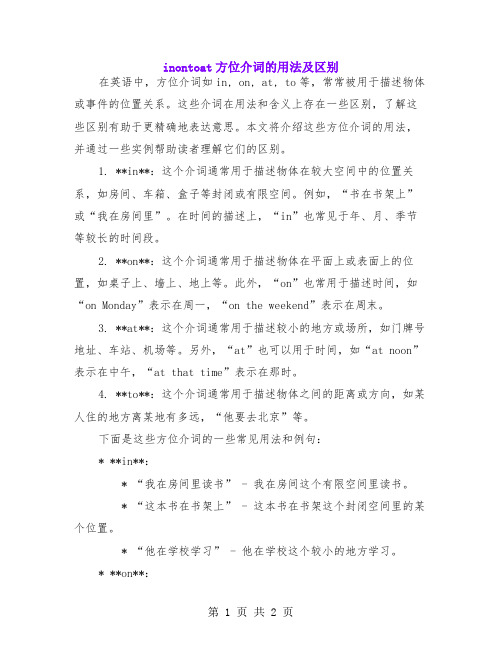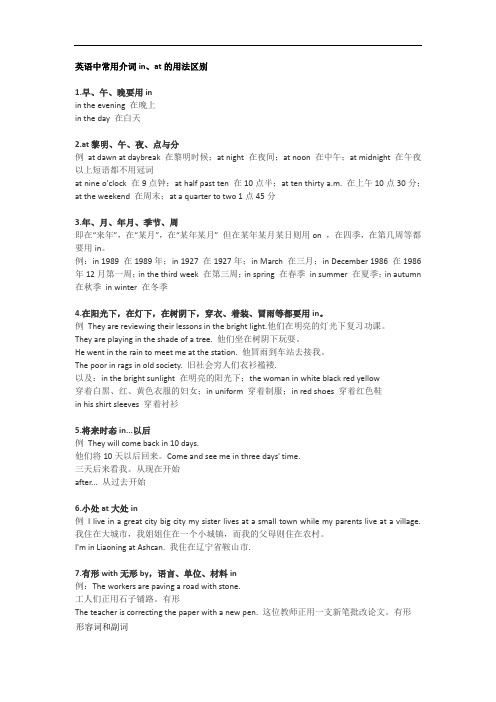英语中常用介词in、on、at、to的用法区别
初中英语介词的用法

介词的用法与规则一. 表示地点位置的介词1、at ,in, on, to,offat(1)表示在小地方;(2)表示“在……附近,旁边”in(1)表示在大地方;(2)表示“在…范围之内”。
on 表示毗邻,接壤,“在……上面”。
to 表示在……范围外,不强调是否接壤;或“到……”区别:1. in表示A地在B地范围之内。
如:Taiwan is in the southeast of China.2. to表示A地在B地范围之外,即二者之间有距离间隔。
如:Japan lies to the east of China.3. on表示A地与B地接壤、毗邻。
如:North Korea is on the east of China.4. off表示“离……一些距离或离……不远的海上”。
如:They arrived at a house off the main road. New Zealand lies off the eastern coast of Australia补充:树上结的果实、叶子和开的花,用介词on, 鸟儿在树上,用介词in。
2)above, over, on 在……上above 指在……上方,不强调是否垂直,与below相对;比如:The bird is flying above my head.over指垂直的上方,与under相对,但over与物体有一定的空间,不直接接触。
比如:There is a bridge over the river.on表示某物体上面并与之接触。
比如:He put his watch on the desk.3)below, under 在……下面under表示在…正下方比如:There is a cat under the table.below表示在……下,不一定在正下方比如:Please write your name below the line.4)in front of, in the front of 在……前面in front of…意思是“在……前面”,指甲物在乙物之前,两者互不包括;其反义词是behind(在……的后面)。
on,in,at,to的用法区别地点

on,in,at,to的用法区别地点摘要:一、概述on、in、at、to的用法区别二、详解on、in、at、to在地点表达中的具体用法1.on2.in3.at4.to三、总结与实践建议正文:【提纲】一、概述on、in、at、to的用法区别在英语中,on、in、at、to是表示地点的常用介词,它们在用法上有一定区别。
了解这些区别有助于我们更准确地表达地点信息。
二、详解on、in、at、to在地点表达中的具体用法1.on"on"表示在某物之上,例如:on the table(在桌子上)、on the ground (在地上)。
此外,它还可以表示在某地附近,如:on the way to the park (在去公园的路上)。
2.in"in"表示在某物之内,如:in the room(在房间里)、in the box(在盒子里)。
它还可以表示在某地范围内,如:in the city(在城市里)。
3.at"at"表示在某地,如:at the library(在图书馆)、at the bus stop(在公交车站)。
它还可以表示在某地点附近,如:at the entrance(在入口处)。
4.to"to"表示到达某地,如:to the park(到公园)、to the supermarket (到超市)。
它还可以表示目的地,如:the airport is the destination to which we are going(机场是我们要去的目的地)。
三、总结与实践建议在实际应用中,我们要根据具体情况选择合适的介词。
了解on、in、at、to的用法区别,有助于提高我们的英语表达水平。
以下是一些实践建议:1.掌握各介词的基本含义和用法,避免在使用时产生歧义。
2.注意观察和学习英语母语者如何在不同场合使用这些介词。
3.多进行英语写作和口语练习,提高自己在地点表达方面的准确性。
in on at地点的用法及区别

in on at地点的用法及区别(原创实用版)目录1.引言2.in on at 地点的含义和用法3.in on at 地点的区别4.实际应用示例5.结论正文1.引言在英语中,表示地点的介词有很多,如 in、on、at 等。
它们在不同情况下有着不同的用法和含义。
本文将探讨这些介词的用法及区别,帮助大家更好地理解和运用它们。
2.in on at 地点的含义和用法(1) in:表示在某个范围较大的地点,如国家、城市、县等。
如:I live in China.(我住在中国。
)(2) on:表示在某个范围较小的地点,如街道、公路、岛屿等。
如:He lives on Main Street.(他住在主街上。
)(3) at:表示在某个具体的地点,如门牌号、建筑物等。
如:She lives at No.10 Main Street.(她住在主街 10 号。
)3.in on at 地点的区别(1) 范围大小:in 表示的范围最大,on 次之,at 最小。
(2) 具体程度:at 表示的最具体,on 次之,in 最不具体。
(3) 是否可数:in 和 on 后跟可数名词单数或不可数名词,而 at 后跟可数名词单数。
4.实际应用示例(1) in:I will visit Japan in the summer vacation.(我将在暑假去日本旅行。
)(2) on:The plane landed on the runway.(飞机降落在跑道上。
)(3) at:We will have a meeting at the library.(我们将在图书馆举行会议。
)5.结论总之,在英语中,in、on、at 是表示地点的常用介词。
它们在用法和含义上有所区别,需要根据实际情况选择合适的介词。
英语中常见的介词和连词的区别和用法

英语中常见的介词和连词的区别和用法介词和连词是英语语法中非常重要的词类,它们在句子中起着连接和衔接的作用。
虽然它们看似相似,但实际上在用法上有着明显的区别。
一、介词1. 介词的定义和作用介词是一种虚词,它通常用来连接名词、代词或动词与其他成分,起到修饰、补充或限定的作用。
例如:- She is sitting on the chair.(她正坐在椅子上。
)- The book is under the table.(书在桌子下面。
)2. 常见的介词及其用法(1)in、on、at这三个介词常用来表示时间、地点和位置。
- in:用于表示年、月、季节、长时间段等。
- I was born in 1990.(我出生在1990年。
)- We usually go swimming in summer.(我们通常在夏天去游泳。
)- on:用于表示具体日期、星期、节日等。
- She will arrive on Monday.(她将在星期一到达。
)- We celebrate Christmas on December 25th.(我们在12月25日庆祝圣诞节。
)- at:用于表示具体时间、地点。
- The meeting will start at 9 o'clock.(会议将在9点开始。
)- I met her at the library.(我在图书馆遇见了她。
)(2)with、without、by这三个介词常用来表示伴随、条件和方式。
- with:表示伴随、附带。
- She went to the party with her friends.(她和她的朋友们一起去了派对。
) - He always carries a book with him.(他总是随身带着一本书。
)- without:表示没有、不带。
- I can't live without you.(没有你我无法生活。
)- Please don't leave without saying goodbye.(请不要离开而不说再见。
inontoat方位介词的用法及区别

inontoat方位介词的用法及区别在英语中,方位介词如in, on, at, to等,常常被用于描述物体或事件的位置关系。
这些介词在用法和含义上存在一些区别,了解这些区别有助于更精确地表达意思。
本文将介绍这些方位介词的用法,并通过一些实例帮助读者理解它们的区别。
1. **in**:这个介词通常用于描述物体在较大空间中的位置关系,如房间、车箱、盒子等封闭或有限空间。
例如,“书在书架上”或“我在房间里”。
在时间的描述上,“in”也常见于年、月、季节等较长的时间段。
2. **on**:这个介词通常用于描述物体在平面上或表面上的位置,如桌子上、墙上、地上等。
此外,“on”也常用于描述时间,如“on Monday”表示在周一,“on the weekend”表示在周末。
3. **at**:这个介词通常用于描述较小的地方或场所,如门牌号地址、车站、机场等。
另外,“at”也可以用于时间,如“at noon”表示在中午,“at that time”表示在那时。
4. **to**:这个介词通常用于描述物体之间的距离或方向,如某人住的地方离某地有多远,“他要去北京”等。
下面是这些方位介词的一些常见用法和例句:* **in**:* “我在房间里读书” - 我在房间这个有限空间里读书。
* “这本书在书架上” - 这本书在书架这个封闭空间里的某个位置。
* “他在学校学习” - 他在学校这个较小的地方学习。
* **on**:* “请把书放在桌子上” - 请把书放在桌子这个平面上。
* “墙上挂着画” - 画挂在墙这个表面上。
* “她在周末看电视” - 她在周末的这个时间段看电视。
* **at**:* “我在家” - 我在家这个地方。
* “他在车站等车” - 他在这个车站等待车辆。
* “我们在周二开会” - 我们在这个星期二的某个时间开会。
* **to**:* “火车离这里还有五公里” - 火车离这里还有五公里的距离。
* “他要去北京工作” - 他要去北京这个目的地工作。
英语中常用介词inonatto的用法区别.

英语中常用介词in、at的用法区别1.早、午、晚要用inin the evening 在晚上in the day 在白天2.at黎明、午、夜、点与分例at dawn at daybreak 在黎明时候;at night 在夜间;at noon 在中午;at midnight 在午夜以上短语都不用冠词at nine o'clock 在9点钟;at half past ten 在10点半;at ten thirty a.m. 在上午10点30分;at the weekend 在周末;at a quarter to two 1点45分3.年、月、年月、季节、周即在“来年”,在“某月”,在“某年某月” 但在某年某月某日则用on ,在四季,在第几周等都要用in。
例:in 1989 在1989年;in 1927 在1927年;in March 在三月;in December 1986 在1986年12月第一周;in the third week 在第三周;in spring 在春季in summer 在夏季;in autumn 在秋季in winter 在冬季4.在阳光下,在灯下,在树阴下,穿衣、着装、冒雨等都要用in。
例They are reviewing their lessons in the bright light.他们在明亮的灯光下复习功课。
They are playing in the shade of a tree. 他们坐在树阴下玩耍。
He went in the rain to meet me at the station. 他冒雨到车站去接我。
The poor in rags in old society. 旧社会穷人们衣衫褴褛.以及:in the bright sunlight 在明亮的阳光下;the woman in white black red yellow穿着白黑、红、黄色衣服的妇女;in uniform 穿着制服;in red shoes 穿着红色鞋in his shirt sleeves 穿着衬衫5.将来时态in...以后例They will come back in 10 days.他们将10天以后回来。
英语中时间介词的用法和区别
介词的用法与区别
1,时间或地点介词in、on、at的区别,表示时间时,in表示在一段时间里(在将来时句子中则表示在一段时间后),on表示在
具体的某一天或者某天的上下午等,at表示在某个时刻或者瞬
间。
表示地点时,in表示在某个范围之内,on表示在某个平面
上或与一个面相接处,at则表示在某个具体的场所或地点。
如:He was born on the morning of May 10th.他出生于五月十日的早
晨。
I usually get up at 7:00 in the morning .我通常在早上七点钟
起床。
His glasses are right on his nose .他的眼睛就架上他的鼻子
上。
He is at the cinema at the moment .此刻他正在电影院。
2,after与in表示时间的区别after+(具体时刻/从句)表示“在…时刻之后”常用于一般时态;“i n+(一段时间)”表示“在(多
久)之后”,常用于将来时态。
如:He said that he would be here after 6:00.他说他六点之后会来这儿. My father is coming back from England in about a month .我父亲大约一
个月以后从英国回来。
in,at,on的用法和区别
in,at,on的用法和区别in, at, on 的用法和区别在平时的学习中,我们经常要运用到这些介词,今天就来了解一下它们。
in 是“在……中”、“在……里面”的意思,也可以表示“(对于)在……上面”,引申为“在某人或某物范围内”。
如: We went to the cinematoday. I was in the hall yesterday evening.At 强调在什么地方或多长时间,与 out 不同,常说成 just from a moment of action 但其后接从句时,通常用短语作主语,谓语常用虚拟语气;有时也用复合结构作主语。
如:My brother is being killedin his car accident.On 表示在几点钟、什么时候,而且通常与数词连用,如 afternoon2时 or one hour 30分等。
例如: He has been back for ten years ago but it isn't over there.由此可见,三者都可以用来表示“在……上”,但含义稍有差异。
相比之下, at 所指的时间较短,基本上只限于“几个小时”,而 time 则不仅指“几个小时”,还包括一段时期,两者的区别是很明显的。
现在我们再看 liken 前的形容词,除 wonderful 外,大部分都可用做定语修饰名词,但仍然有一些特殊情况。
如果修饰动词时,则要放在 be 动词之后,如: he can play basketball and she likes playing computer games. If you want to know more about her, please visit her home. She liked watching TV when she gets up early. When i get up late this morning, my mother told me that our class had not only changed since last semesters but also given new teacher nowadays.当出现 such as with sth.+ adj.+n.+ prep.(= so). e. g. A lot of people like talking English well- known both by Chinese women and men! And all those two are important roles in society because they make much difference between individuals’ life style and nature; and we should learn these words in practice. The weather here isa very difficult place ina country where somany houses lie inside three miles above groundwater flooring s. But others like many places except china` sich island some parts do exist already.另外,像 fancy, wonder, doubt, surprise, curiosity, fear,disappointment, despair, dread, hope, wish, promise,insistence, congratulation, aspiration, anticipation,expectation, envisage, expected, expecton what will happen tomorrow? This news goes into question whether anyother month may come?关于 exciting, surprising, curious, hopeful,suspicious, marvelous, shocking, surprised, frightened,excited, unbelievable, amazed, incredible, odd,unimaginable, absurd, amazing, extraordinary, boring,horrible, terriblely 等词也有类似问题,我们将在后文中详细讲述。
英语中介词 in, at, on的用法区分小结.doc
英语中介词 in, at, on的用法区分小结一、都可以表示时间,但是所表示的范围不同表示具体时间或者年龄时用at例如:at 6 oclock, at the age of five表示上下午,或者月年的时候用in例如:in the morning, in 2017 ,in Februaryin+时间段表示多久以后/以内例如:in ten minutes表示星期,特定的日期或具体某一天用on例如:on Sunday, on Teachers Dayon the third of June,on也可表示在具体某一天上下午例如:on the morning of May , on Monday afternoon等二、都可以表示地点位置at 通常指小位置,in 指大位置,on指在某物表面例如:at the station, in Beijing, on the table三、in the tree与on the tree区分in the tree 指树外之物,也就是后进入的例如:There is a bird in the tree.on the tree 指树中之物,也就是树上自己长出来的例如:There are many apples on the tree.四、强化习题( )A lot of students in our school were born____ May,1998.A.inB.atC.onD.since() She suddenly returned____a rainy night.A.onB.atC.inD.during() My grandmother was born____Oct.12,1964.A.onB.inC.atD.of() The train is starting___ten minutes.A.inB.atC.forD.still()Tom does his exercises____ six _____the evening.A.on;toB.at;inC.by;ofD.at;on()We wake up very early____the morning of Christmas Day.A.inB.onC.forD.at答案:A A A A B B 你做对了吗?。
(完整版)英语中介词的用法以及动词的用法讲解
英语中介词的用法⑴时间或地点介词in、on、at的用法区别:表示时间时,in表示在一段时间里(在将来时句子中则表示在一段时间之后),on表示在具体的某一天或者某天的上下午等,at表示在某个时刻或者瞬间;表示地点时,in表示在某个范围之内,on表示在某个平面上或与一个面相接触,at则表示在某个具体的场所或地点。
如:He was born on the morning of May 10th.(他出生于五月十日的早晨)/ I usually get up at 7:00 in the morning.(我通常在早上的七点钟起床)/ His glasses are right on his nose.(他的眼镜就架在他的鼻子上)/ He is at the cinema at the moment.(此刻他正在电影院)⑵ after与in表示时间的用法区别:“after+(具体时刻/从句)”表示“在…时刻之后”常用于一般时态;“in+(一段时间)”表示“在(多久)之后”,常用于将来时态。
如:He said that he would be here after 6:00.(他说他六点钟之后会来这儿)/ My father is coming back from England in about a month.(我父亲大约一个月以后从英国回来)⑶ since与for表示时间的用法区别:“since+(具体时刻/that-从句)”表示“自从…起一直到现在”,“for +(一段斶间)”表示“总共有…之久”,都常用于完成时态;如:Uncle Li has worked in this factory since 1970.(李叔叔自从1970年起就在这家工厂工作了)/ Uncle Li has worked in this factory for over 30 years. (李叔叔在这家工厂已经工作了30多年)⑷ by、in与with表示方式的用法区别:都可以表示“工具、手段”,但是by 主要表示“乘坐”某个交通工具或“以……方式”,在被动句中可以表示动作的执行者;in表示“使用”某种语言/文字,with表示“使用”某个具体的工具、手段。
- 1、下载文档前请自行甄别文档内容的完整性,平台不提供额外的编辑、内容补充、找答案等附加服务。
- 2、"仅部分预览"的文档,不可在线预览部分如存在完整性等问题,可反馈申请退款(可完整预览的文档不适用该条件!)。
- 3、如文档侵犯您的权益,请联系客服反馈,我们会尽快为您处理(人工客服工作时间:9:00-18:30)。
英语中常用介词in、on、at、to的用法区别介词是英语用词中的一大项,涉及面较广且用法也较灵活,所以记起来很是麻烦,下面我把一些习惯用的介词作了一个小节,供以参考。
早、午、晚要用in,at黎明、午夜、点与分。
年、月、年月、季节、周,阳光、灯、影、衣、冒in。
将来时态in...以后,小处at大处in。
有形with无形by,语言、单位、材料in。
特征、方面与方式,心情成语惯用in。
介词at和to表方向,攻击、位置、恶、善分。
日子、日期、年月日,星期加上早、午、晚,收音、农场、值日on,关于、基础、靠、著论。
着、罢、出售、偷、公、假,故意、支付、相反,准。
特定时日和“一……就”,on后常接动名词。
年、月、日加早、午、晚,of之前on代in。
步行、驴、马、玩笑on,cab,carriage则用in。
at山脚、门口、在当前,速、温、日落、价、核心。
如大体掌握上面介词用法口诀,就不易出错。
当然,至于介词的详尽用法,同形词又是连词及副词等内容此篇不讲。
下面对该口诀分别举例帮助你理解消化。
早、午、晚要用inin the evening 在晚上in the day 在白天例: in the afternoon 在下午in the morning 在早上at黎明、午、夜、点与分例 at dawn at daybreak 在黎明时候at night 在夜间at noon 在中午at midnight 在午夜以上短语都不用冠词at nine o'clock 在9点钟at 8:30 seven thirty 在8点半at half past ten 在10点半at nine fifteen 在9点15分at ten thirty a.m. 在上午10点30分也可以写成seven to five 5点差7分半小时以上five minutes after two 2点过5分at the weekend 在周末at a quarter to two 1点45分年、月、年月、季节、周即在“来年”,在“某月”,在“某年某月” 但在某年某月某日则用on ,在四季,在第几周等都要用in。
例:in 1989 在1989年in 1927 在1927年in March 在三月in April 在四月in December 1986 在1986年12月in July l984 在1984年7月in the first week of this semester这学期的第一周in the third week 在第三周in spring 在春季 in summer 在夏季in autumn 在秋季 in winter 在冬季阳光、灯、影、衣、冒 in即在阳光下,在灯下,在树阴下,穿衣、着装、冒雨等都要用in。
例:Don't write in dim light.切勿在暗淡的灯光下写字。
They are reviewing their lessons in thebright light.他们在明亮的灯光下复习功课。
They are playing in the shade of a tree.他们坐在树阴下玩耍。
a prisoner in irons 带着镣铐的囚犯He went in the rain to meet me at thestation. 他冒雨到车站去接我。
The poor in rags in old society. 旧社会穷人们衣衫褴褛.以及:in the bright sunlight 在明亮的阳光下a merchant in disguise 乔装的商人the woman in white black red yellow穿着白黑、红、黄色衣服的妇女in uniform 穿着制服in mourning 穿着丧服in red shoes 穿着红色鞋in his shirt sleeves 穿着衬衫将来时态in...以后例 They will come back in 10 days.他们将10天以后回来。
I'll come round in a day or two.我一两天就回来。
We'll be back in no time.我们一会儿就回来。
Come and see me in three days' time.三天后来看我。
从现在开始after... 从过去开始小处at大处in例:Li and I arrived at Heishan county safe and sound all is well. Don't worry. 李和我平安地到达黑山县,一切很好,勿念。
I live in a great city big city my sister lives at a small town while my parents live at a village. 我住在大城市,我姐姐住在一个小城镇,而我的父母则住在农村。
I'm in Liaoning at Ashcan. 我住在辽宁省鞍山市.有形with无形by,语言、单位、材料in例:The workers are paving a road with stone.工人们正用石子铺路。
有形The teacher is correcting the paper with a new pen. 这位教师正用一支新笔批改论文。
有形〃Taking Tiger Mountain by Strategy〃 is a good opera. 《智取威虎山》是一出好戏。
无形The product is separated by distillation into gasoline and gas oil. 这种产品是用蒸馏分离出气油和粗柴油。
表示方式、手段、方法,无形I really can't express my idea in English freely indeed. 我确实不能用英语流利地表达我的思想。
表示某种语言用inI wrote a novel in Russian. 我用俄语写了一本小说。
同上The kilometer is the biggest unit of length in the metric system. 公里是米制中最长的长度单位。
表示度、量、衡单位的用inThe length is measured in meter kilometer and centimeter. 长度是以米、公里、厘米为单位来计算的。
同上This board was cast in bronze not in silver . 这个牌匾是铜铸的,不是银制的。
特征、方面与方式、心情、成语惯用in特征或状态:例 They found the patient in a coma. 他们发现病人处于昏迷状态。
The Democratic Party was then in power. 那时民主党执政。
He has not been in good health for some years. 他几年来身体一直不好。
Many who came in despair went away in hope. 许多人带着绝望情绪而来,却满怀希望而去。
The house was in ruins. 这房屋成了废墟。
The poor girl was in tears. 这个可怜的女孩泪流满面。
Her clothes were in rags. 她的衣跟穿破了。
His shoes were in holes. 他的鞋穿出窟窿了。
I only said it in fun. 我说这话只是开玩笑的。
She spoke in grief rather than in anger. 与其说她讲得很气愤,不如说她讲得很伤心。
还有一些短语也用in,如:in jest 诙谐地,in joke 开玩笑地,in fairness 公正地,in spite 恶意地, in revenge 报复 in mercy 宽大,in sorrow 伤心地等。
His mind was in great confusion. 他脑子里很乱。
Today everybody is in high spirits and no one is in low ebb. 今天大家都兴高采烈,没有一个情绪低落的。
She and her classmates are in flower ages. 她和她的同学都正值妙龄。
The campaign was in full swing. 运动正值高潮中。
方面:例:we accepted the item in principle. 我们在原则上接受了这个条款。
The backward area has achieved self-sufficient in grain. 这个落后的地区在粮食方面已能自给。
A good teacher must be an example in study. 一个好的教师必须是学习的模范。
They are never backward in giving their views. 他们从来不怕发表自己的意见。
方式:例:All the speeches were taken down in shorthand. 所有报告都用速记记录下来了。
The Party has always educated us in the spirit of patriotism and internationalism. 党一贯以爱国主义和国际主义精神教育我们。
如下成语惯用in例: in all 总计in advance 事前in addition to 除......以外in the meantime 与此同时in place 适当地in hopes of或in the hope of 怀着.......希望in connection with 和......有关in contact with 和......联系in case of 倘若,万一in conflict with 和......冲突in force 有效的,大批in depth 彻底地in regard to 关于in the neighborhood of 大约、邻近in retrospect 回顾,一想起in alarm 惊慌、担心in behalf of 代表......利益in the least 一点,丝毫in the opinion of 据......见解in the long run 从长远说来in one's opinion 在......看来in a word 总之in word 口头上in vain 无益地白白地in case 如果,万一,以防in detail 详细地in haste 急急忙忙地in conclusion 总之in spite of 尽管in other words... 换句话说in love 恋爱中in debt 负债in fun jest、joke 玩笑地in hesitation 犹豫不决in wonder 在惊奇中in return 作为回报in the name of 以......名义be confident in 对......有信心be interested in 对......感兴趣in doubt 怀疑in public secret 公开他秘密地in a good humor 心情情绪好介词at、to表方向,攻击、位置、善、恶、分介词at和to都可以表示方向。
